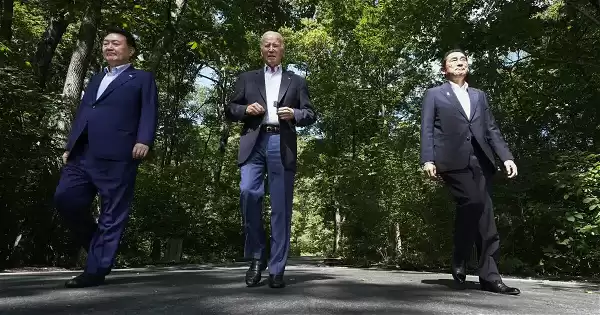"Japan-South Korea Leaders Join President Biden at Camp David for Rare Three-Way Summit, Announce Joint Defense Strategy"
Leaders of Japan, South Korea, and the United States strengthen cooperation and security in the Indo-Pacific region through defense agreements.
In a rare and historic three-way summit, President Biden, Japanese Prime Minister Fumio Kishida, and South Korean President Yoon Suk Yeol gathered at Camp David to discuss and plan a joint defense strategy. This meeting, covered extensively by the Los Angeles Times, was prompted by the common threats posed by North Korea and China, which have managed to unite these nations despite their past animosity.
During the summit, the leaders announced a series of measures aimed at bolstering their defense capabilities and confronting belligerent forces. These steps include annual military exercises, enhanced ballistic missile detection systems, the establishment of a regional crisis hotline, and other initiatives designed to strengthen their ability to respond to security challenges.
Speaking from the picturesque grounds of Camp David, President Biden hailed this trilateral meeting as the beginning of a "new chapter" in their relations. He emphasized that their unity not only serves to strengthen their respective countries but also contributes to a safer world. The leaders recognized the importance of standing together in the face of challenges and commended each other's political courage for attending the summit.
A key concern raised during the subsequent news conference was whether the agreements made by these leaders would endure beyond their terms in office. President Biden addressed this by assuring that the announced initiatives were "institutional changes" intended to create momentum and ensure the longevity of the relationship between the three nations. This commitment is particularly noteworthy considering the previous administration's efforts to reduce the U.S. presence in East Asia and scale back defense assistance.
This trilateral summit marks a significant milestone in the diplomatic efforts to ease tensions between Japan and South Korea, two nations with a history of animosity. It is the first time these leaders have come together in this format, rather than on the sidelines of another meeting. Furthermore, it is the first meeting with foreign leaders at Camp David in eight years, lending symbolic weight to the occasion.
The defense agreements announced during the summit are expected to strengthen cooperation and security throughout the Indo-Pacific region, which has become a focal point for the Biden administration's economic and diplomatic priorities. By establishing a solid foundation for this trilateral partnership, the leaders aim to ensure its depth, strength, and longevity.
In conclusion, the trilateral summit at Camp David between President Biden, Prime Minister Kishida, and President Yoon represents a significant step forward in the defense strategy of Japan, South Korea, and the United States. Despite their historical animosity, the shared threats posed by North Korea and China have brought these nations together. The agreements made during the summit, including military exercises, improved missile detection systems, and a crisis hotline, demonstrate their commitment to confronting belligerent forces and ensuring regional security. This historic meeting sets the stage for a new chapter in their relations and strengthens their collective ability to address shared challenges.











Comments on "Japan-South Korea Leaders Join President Biden at Camp David for Rare Three-Way Summit, Announce Joint Defense Strategy"